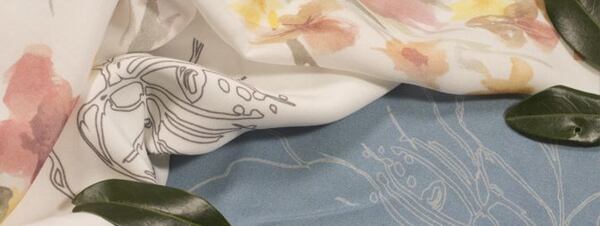
Rayon, or viscose, has always had the potential to be an ecological player. Made from regenerated cellulose, it can come from practically any source that contains that material – wood, recycled cotton, even rayon itself.
Our post on the many faces of rayon discusses the production process in detail, but, in a nutshell, cellulose for rayon usually comes from wood and there are a number of ways to produce the fiber itself. The original, and simplest, way is not terribly ecological, because it generates waste products that are never reused. New methods recuperate the chemical substances at the end of the manufacturing process to feed back into the system, so waste is eliminated. Companies are also learning to tap truly renewable resources, such as wood from sustainably managed forests.
Innovations at Lenzing
The Austrian company Lenzing specializes in rayon and has been striving to innovate their production methods for a number of years now. It was Lenzing that brought us Tencel, a type of viscose fiber (lyocell or modal) derived from sustainable wood sources. The water and solvents used in production are almost entirely recycled, no chlorine bleaching agents are applied and ecological pigments are used in the dying process.
Tencel can also be made using a technology called Refibra, which makes it possible to gain cellulose from cotton, for example from cotton scraps discarded by the garment industry.
Lenzing takes environmental responsibility seriously, implementing waste reduction measures throughout its manufacturing network.
Lenzing EcoVero
The viscose fiber EcoVero sets even stricter environmental standards than Tencel. In terms of water and chemical consumption and its carbon footstep, EcoVero is the most ecologically responsible textile out there, surpassing not only other types of rayon, but cotton as well. Supply chain transparency is maximized, from the farming of raw materials, through production, to distribution.
EcoVero is fully biodegradable and compostable. It is easy to recycle (it can be recouped to produce new viscose fibers), but if it does end up in a landfill, it will biodegrade entirely in several months without releasing any toxic chemicals into the soil.
In terms of its fiber qualities, EcoVero resembles other premium rayons: Fine, soft, breathable, very comfortable, good at wicking away moisture, and relatively quick drying. In terms of care, it can be washed, dried, and ironed just like other rayon fabrics.
Not sure what difference there is between modal and cupro, or just how rayon fibers are made? Read our complete overview.
Got any clothes made of EcoVero?
Ever used EcoVero in your sewing?
Share your stories in the comments below!



Comments(0)